Cognitive Approaches to Learning and Cognitive Load Theory Analysis
VerifiedAdded on 2022/08/23
|6
|940
|25
Essay
AI Summary
This essay explores the impact of cognitive approaches to learning and cognitive load theory. It defines cognitive approaches as how learners structure information, emphasizing mental activities like thinking and remembering. Cognitive load theory, an instructional design theory, is also discussed, highlighting its role in optimizing teaching methods to align with cognitive architecture. The essay covers how information is processed, stored, and transferred from working to long-term memory. It also discusses principles for improving learning experiences, the role of motivation, and the importance of practical skills and feedback. The conclusion emphasizes the need for students to develop effective learning skills and actively engage with educational challenges. The essay also refers to the concept of social cognitive theory, where people learn by observing others. References to key researchers and their works are included to support the arguments.
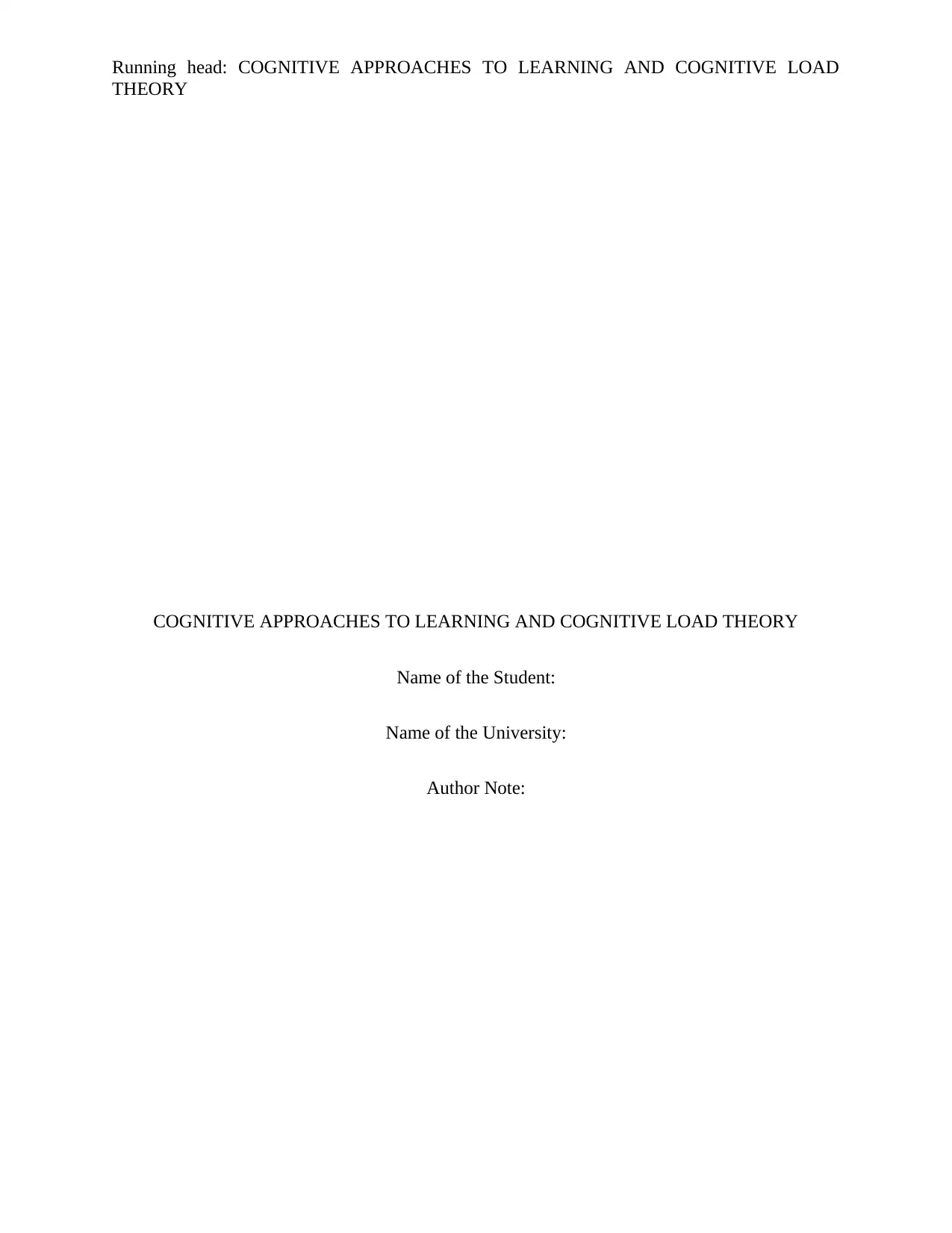
Running head: COGNITIVE APPROACHES TO LEARNING AND COGNITIVE LOAD
THEORY
COGNITIVE APPROACHES TO LEARNING AND COGNITIVE LOAD THEORY
Name of the Student:
Name of the University:
Author Note:
THEORY
COGNITIVE APPROACHES TO LEARNING AND COGNITIVE LOAD THEORY
Name of the Student:
Name of the University:
Author Note:
Paraphrase This Document
Need a fresh take? Get an instant paraphrase of this document with our AI Paraphraser
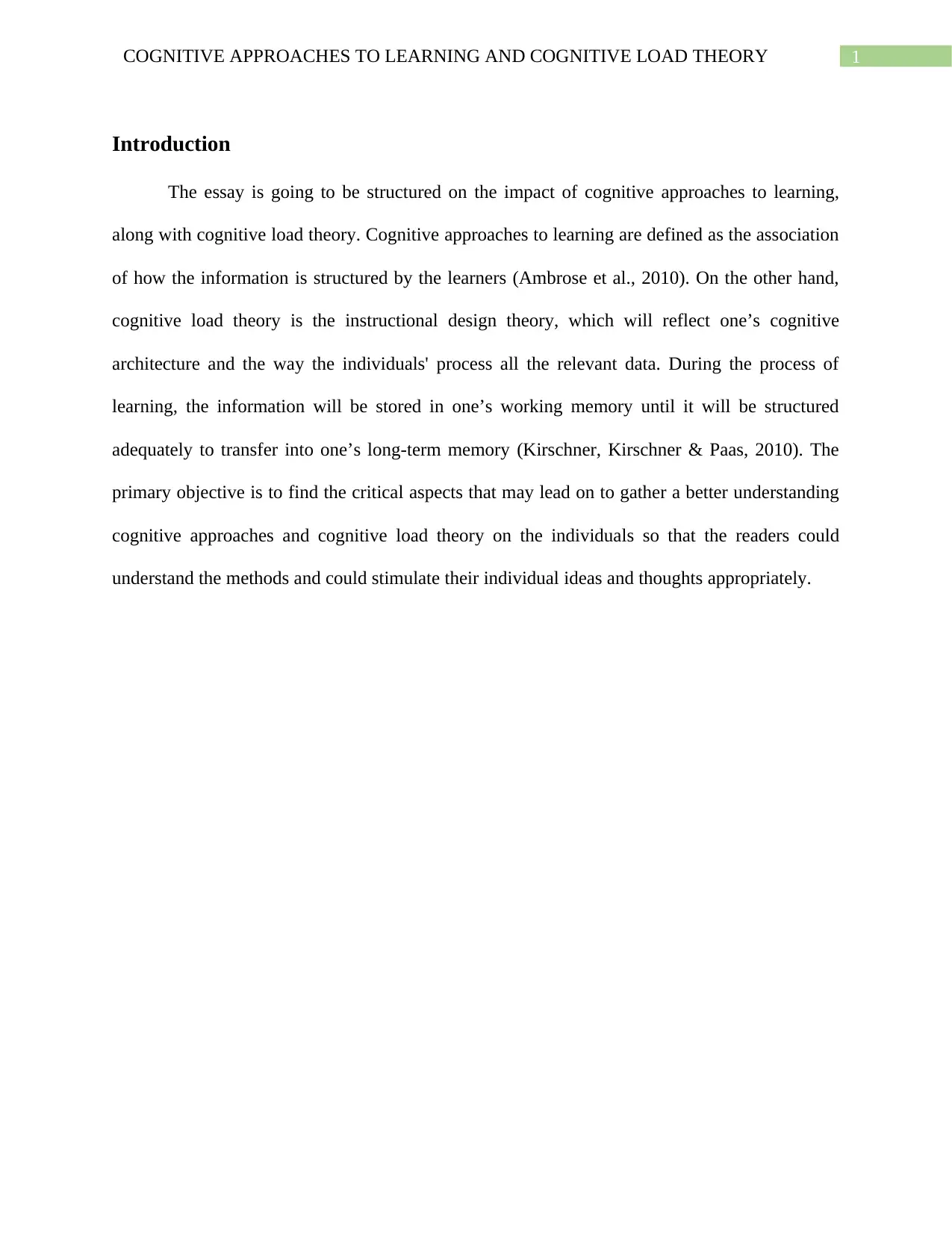
1COGNITIVE APPROACHES TO LEARNING AND COGNITIVE LOAD THEORY
Introduction
The essay is going to be structured on the impact of cognitive approaches to learning,
along with cognitive load theory. Cognitive approaches to learning are defined as the association
of how the information is structured by the learners (Ambrose et al., 2010). On the other hand,
cognitive load theory is the instructional design theory, which will reflect one’s cognitive
architecture and the way the individuals' process all the relevant data. During the process of
learning, the information will be stored in one’s working memory until it will be structured
adequately to transfer into one’s long-term memory (Kirschner, Kirschner & Paas, 2010). The
primary objective is to find the critical aspects that may lead on to gather a better understanding
cognitive approaches and cognitive load theory on the individuals so that the readers could
understand the methods and could stimulate their individual ideas and thoughts appropriately.
Introduction
The essay is going to be structured on the impact of cognitive approaches to learning,
along with cognitive load theory. Cognitive approaches to learning are defined as the association
of how the information is structured by the learners (Ambrose et al., 2010). On the other hand,
cognitive load theory is the instructional design theory, which will reflect one’s cognitive
architecture and the way the individuals' process all the relevant data. During the process of
learning, the information will be stored in one’s working memory until it will be structured
adequately to transfer into one’s long-term memory (Kirschner, Kirschner & Paas, 2010). The
primary objective is to find the critical aspects that may lead on to gather a better understanding
cognitive approaches and cognitive load theory on the individuals so that the readers could
understand the methods and could stimulate their individual ideas and thoughts appropriately.
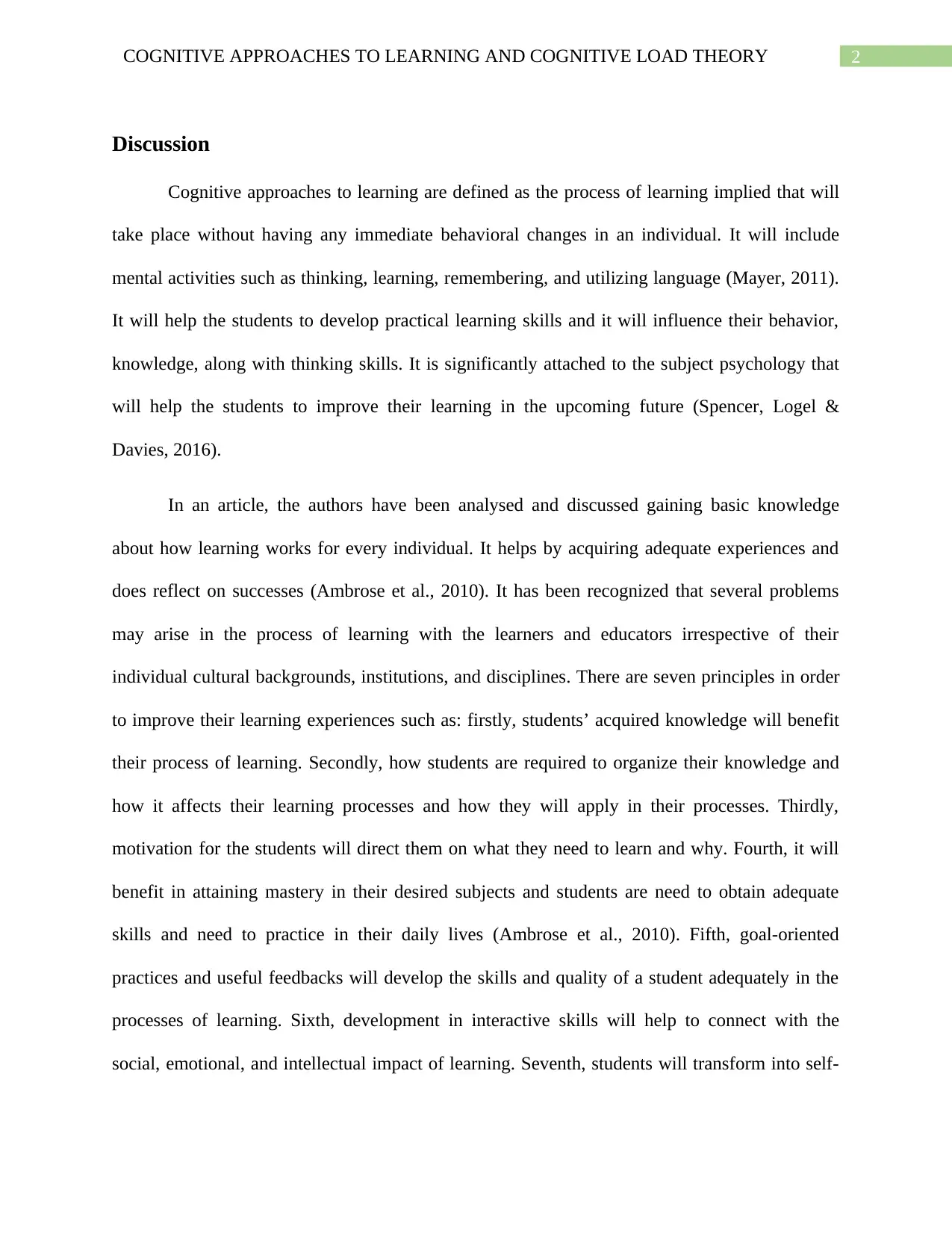
2COGNITIVE APPROACHES TO LEARNING AND COGNITIVE LOAD THEORY
Discussion
Cognitive approaches to learning are defined as the process of learning implied that will
take place without having any immediate behavioral changes in an individual. It will include
mental activities such as thinking, learning, remembering, and utilizing language (Mayer, 2011).
It will help the students to develop practical learning skills and it will influence their behavior,
knowledge, along with thinking skills. It is significantly attached to the subject psychology that
will help the students to improve their learning in the upcoming future (Spencer, Logel &
Davies, 2016).
In an article, the authors have been analysed and discussed gaining basic knowledge
about how learning works for every individual. It helps by acquiring adequate experiences and
does reflect on successes (Ambrose et al., 2010). It has been recognized that several problems
may arise in the process of learning with the learners and educators irrespective of their
individual cultural backgrounds, institutions, and disciplines. There are seven principles in order
to improve their learning experiences such as: firstly, students’ acquired knowledge will benefit
their process of learning. Secondly, how students are required to organize their knowledge and
how it affects their learning processes and how they will apply in their processes. Thirdly,
motivation for the students will direct them on what they need to learn and why. Fourth, it will
benefit in attaining mastery in their desired subjects and students are need to obtain adequate
skills and need to practice in their daily lives (Ambrose et al., 2010). Fifth, goal-oriented
practices and useful feedbacks will develop the skills and quality of a student adequately in the
processes of learning. Sixth, development in interactive skills will help to connect with the
social, emotional, and intellectual impact of learning. Seventh, students will transform into self-
Discussion
Cognitive approaches to learning are defined as the process of learning implied that will
take place without having any immediate behavioral changes in an individual. It will include
mental activities such as thinking, learning, remembering, and utilizing language (Mayer, 2011).
It will help the students to develop practical learning skills and it will influence their behavior,
knowledge, along with thinking skills. It is significantly attached to the subject psychology that
will help the students to improve their learning in the upcoming future (Spencer, Logel &
Davies, 2016).
In an article, the authors have been analysed and discussed gaining basic knowledge
about how learning works for every individual. It helps by acquiring adequate experiences and
does reflect on successes (Ambrose et al., 2010). It has been recognized that several problems
may arise in the process of learning with the learners and educators irrespective of their
individual cultural backgrounds, institutions, and disciplines. There are seven principles in order
to improve their learning experiences such as: firstly, students’ acquired knowledge will benefit
their process of learning. Secondly, how students are required to organize their knowledge and
how it affects their learning processes and how they will apply in their processes. Thirdly,
motivation for the students will direct them on what they need to learn and why. Fourth, it will
benefit in attaining mastery in their desired subjects and students are need to obtain adequate
skills and need to practice in their daily lives (Ambrose et al., 2010). Fifth, goal-oriented
practices and useful feedbacks will develop the skills and quality of a student adequately in the
processes of learning. Sixth, development in interactive skills will help to connect with the
social, emotional, and intellectual impact of learning. Seventh, students will transform into self-
⊘ This is a preview!⊘
Do you want full access?
Subscribe today to unlock all pages.

Trusted by 1+ million students worldwide
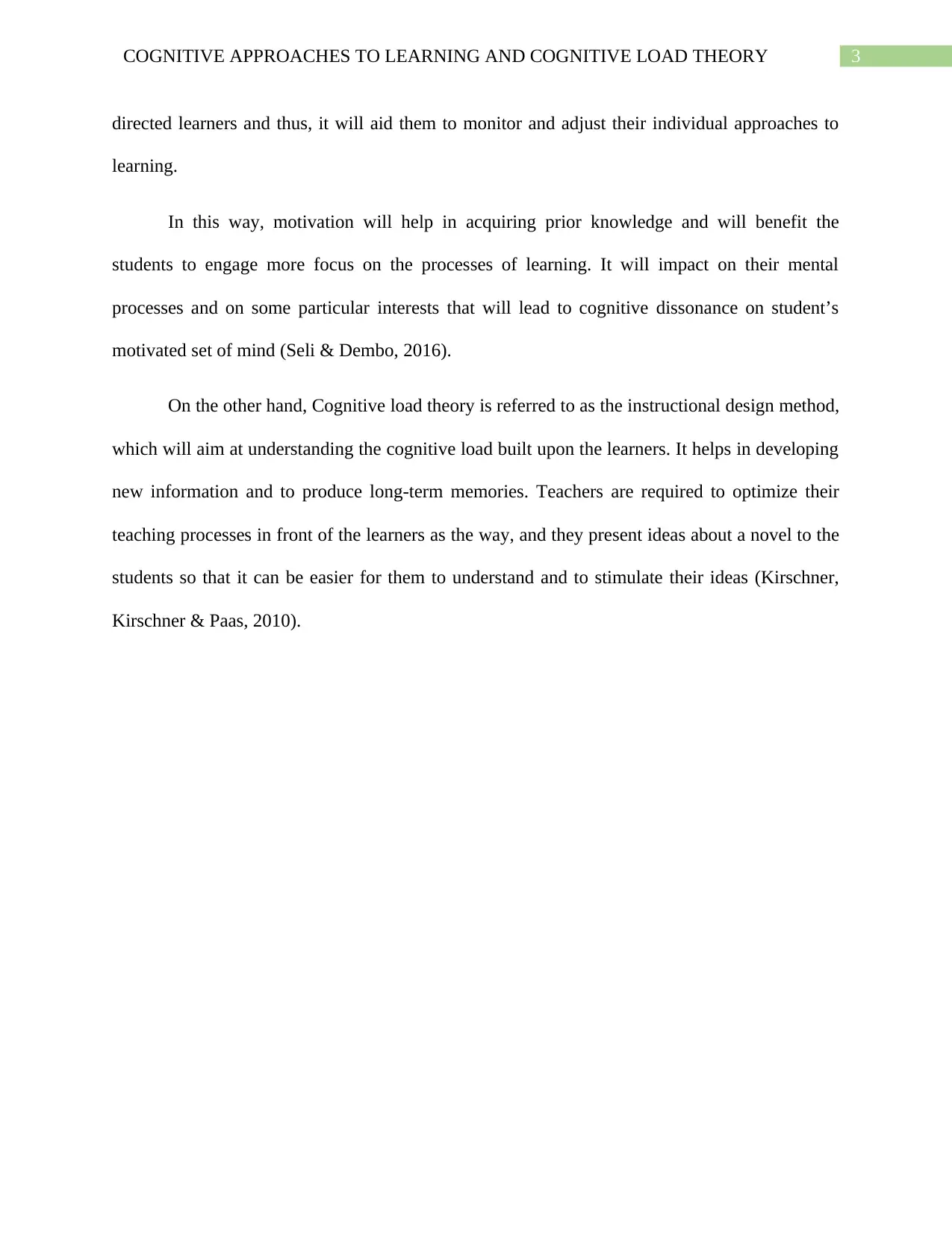
3COGNITIVE APPROACHES TO LEARNING AND COGNITIVE LOAD THEORY
directed learners and thus, it will aid them to monitor and adjust their individual approaches to
learning.
In this way, motivation will help in acquiring prior knowledge and will benefit the
students to engage more focus on the processes of learning. It will impact on their mental
processes and on some particular interests that will lead to cognitive dissonance on student’s
motivated set of mind (Seli & Dembo, 2016).
On the other hand, Cognitive load theory is referred to as the instructional design method,
which will aim at understanding the cognitive load built upon the learners. It helps in developing
new information and to produce long-term memories. Teachers are required to optimize their
teaching processes in front of the learners as the way, and they present ideas about a novel to the
students so that it can be easier for them to understand and to stimulate their ideas (Kirschner,
Kirschner & Paas, 2010).
directed learners and thus, it will aid them to monitor and adjust their individual approaches to
learning.
In this way, motivation will help in acquiring prior knowledge and will benefit the
students to engage more focus on the processes of learning. It will impact on their mental
processes and on some particular interests that will lead to cognitive dissonance on student’s
motivated set of mind (Seli & Dembo, 2016).
On the other hand, Cognitive load theory is referred to as the instructional design method,
which will aim at understanding the cognitive load built upon the learners. It helps in developing
new information and to produce long-term memories. Teachers are required to optimize their
teaching processes in front of the learners as the way, and they present ideas about a novel to the
students so that it can be easier for them to understand and to stimulate their ideas (Kirschner,
Kirschner & Paas, 2010).
Paraphrase This Document
Need a fresh take? Get an instant paraphrase of this document with our AI Paraphraser
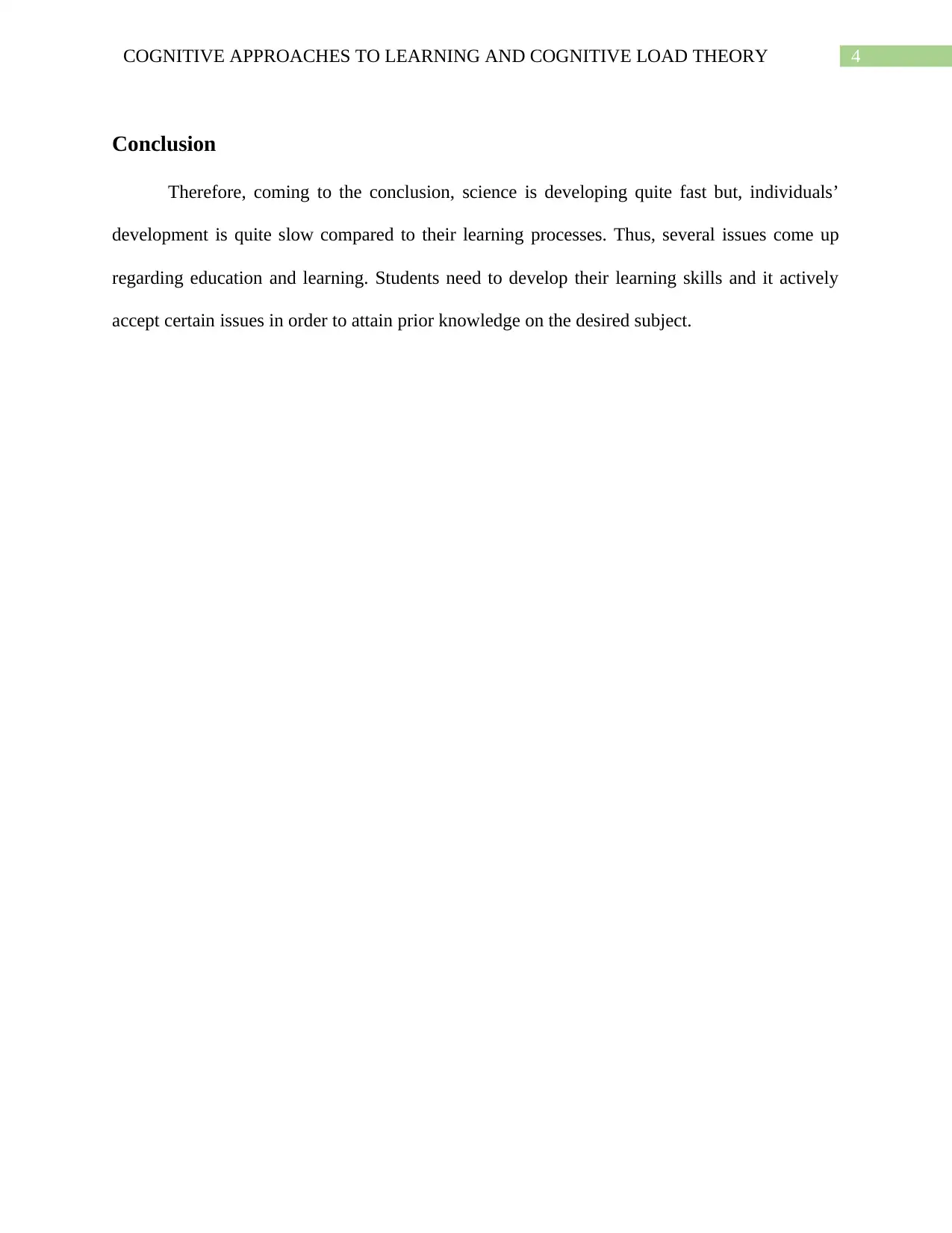
4COGNITIVE APPROACHES TO LEARNING AND COGNITIVE LOAD THEORY
Conclusion
Therefore, coming to the conclusion, science is developing quite fast but, individuals’
development is quite slow compared to their learning processes. Thus, several issues come up
regarding education and learning. Students need to develop their learning skills and it actively
accept certain issues in order to attain prior knowledge on the desired subject.
Conclusion
Therefore, coming to the conclusion, science is developing quite fast but, individuals’
development is quite slow compared to their learning processes. Thus, several issues come up
regarding education and learning. Students need to develop their learning skills and it actively
accept certain issues in order to attain prior knowledge on the desired subject.
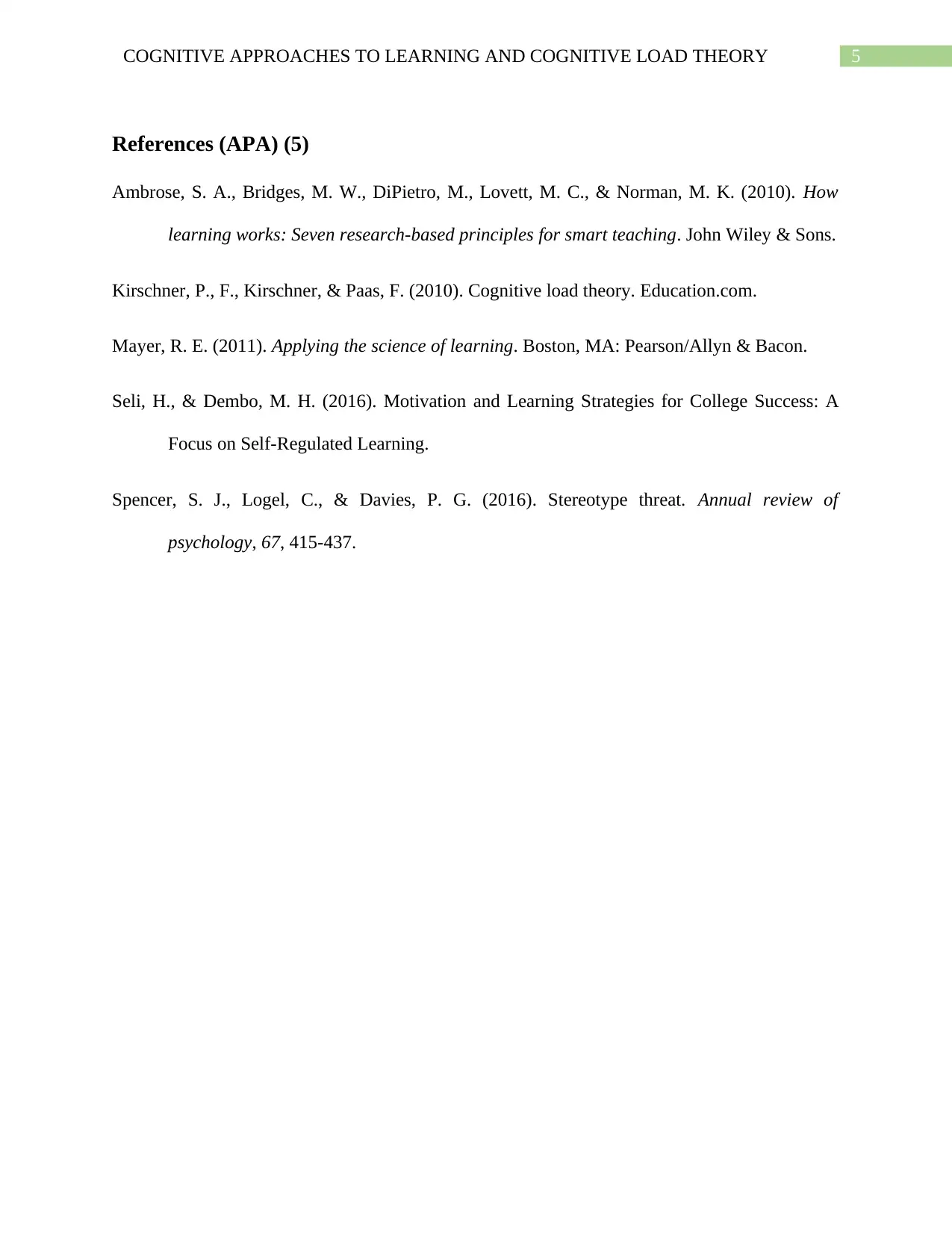
5COGNITIVE APPROACHES TO LEARNING AND COGNITIVE LOAD THEORY
References (APA) (5)
Ambrose, S. A., Bridges, M. W., DiPietro, M., Lovett, M. C., & Norman, M. K. (2010). How
learning works: Seven research-based principles for smart teaching. John Wiley & Sons.
Kirschner, P., F., Kirschner, & Paas, F. (2010). Cognitive load theory. Education.com.
Mayer, R. E. (2011). Applying the science of learning. Boston, MA: Pearson/Allyn & Bacon.
Seli, H., & Dembo, M. H. (2016). Motivation and Learning Strategies for College Success: A
Focus on Self-Regulated Learning.
Spencer, S. J., Logel, C., & Davies, P. G. (2016). Stereotype threat. Annual review of
psychology, 67, 415-437.
References (APA) (5)
Ambrose, S. A., Bridges, M. W., DiPietro, M., Lovett, M. C., & Norman, M. K. (2010). How
learning works: Seven research-based principles for smart teaching. John Wiley & Sons.
Kirschner, P., F., Kirschner, & Paas, F. (2010). Cognitive load theory. Education.com.
Mayer, R. E. (2011). Applying the science of learning. Boston, MA: Pearson/Allyn & Bacon.
Seli, H., & Dembo, M. H. (2016). Motivation and Learning Strategies for College Success: A
Focus on Self-Regulated Learning.
Spencer, S. J., Logel, C., & Davies, P. G. (2016). Stereotype threat. Annual review of
psychology, 67, 415-437.
⊘ This is a preview!⊘
Do you want full access?
Subscribe today to unlock all pages.

Trusted by 1+ million students worldwide
1 out of 6
Related Documents
Your All-in-One AI-Powered Toolkit for Academic Success.
+13062052269
info@desklib.com
Available 24*7 on WhatsApp / Email
![[object Object]](/_next/static/media/star-bottom.7253800d.svg)
Unlock your academic potential
Copyright © 2020–2026 A2Z Services. All Rights Reserved. Developed and managed by ZUCOL.




